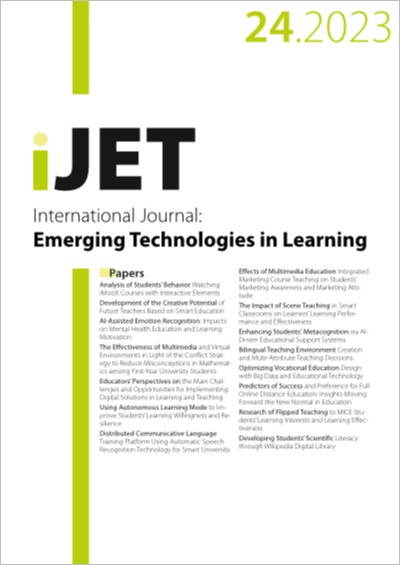Research of Flipped Teaching to MICE Students’ Learning Interests and Learning Effectiveness
DOI:
https://doi.org/10.3991/ijet.v18i24.44323Keywords:
flipped teaching, exhibition students, learning interests, learning effectivenessAbstract
The integration of information into teaching through methods such as e-classrooms, interactive whiteboards, and the widespread adoption of “e-textbooks” provided by publishers has equipped educators with dynamic and engaging instructional models. This is progressively becoming the norm in the educational landscape. Recently, flipped teaching methods have received significant attention. By providing online resources and multimedia materials for students to review before class, teachers can allocate more classroom time to facilitating discussions about the lesson. In this study, an experimental investigation was conducted using flipped teaching in an educational setting that focused on training students for exhibitions. The objective was to evaluate the influence of flipped teaching on students’ interest in learning and overall academic effectiveness. According to the experimental findings, the group taught using flipped teaching methods outperformed the traditionally taught control group in terms of learning interest. This demonstrates that flipped teaching has the potential to stimulate student interest. Furthermore, the group that was taught through flipped teaching demonstrated superior learning effectiveness compared to the traditional teaching group, indicating that flipped teaching can enhance academic outcomes. These research results can serve as a valuable reference for future enhancements in teaching. The goal is to create a more relaxed and autonomous learning environment for students by replacing traditional textbook learning with information technology-integrated teaching.
Downloads
Published
How to Cite
Issue
Section
License
Copyright (c) 2023 Chich-Jen Shieh (Submitter); I-Ying Chang, Wan-Yu Chang

This work is licensed under a Creative Commons Attribution 4.0 International License.



